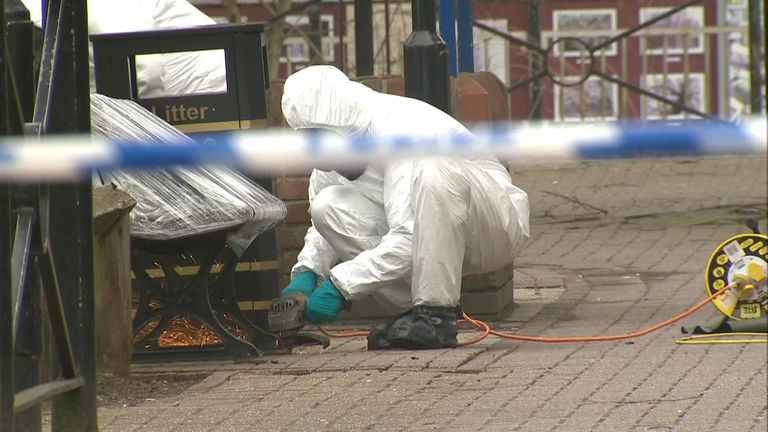Sky Views: What's really frightening about Salisbury is how little we know

Tuesday 17 July 2018 03:26, UK
Paul Kelso, health correspondent
The day after police confirmed that Dawn Sturgess and Charlie Rowley had been poisoned with a novichok nerve agent, we stopped a woman on Salisbury High Street to ask how she felt.
"I'm not worried," she said. "You have got more chance of being knocked over by a bus than you have of being poisoned by novichok in Salisbury."
Her answer captured the keep-calm-and-carry-on disposition of a city weary of attention after almost five months at the centre of an international spy mystery.
Unfortunately, it was also wrong.
According to the Salisbury Journal, bus crashes have been mercifully rare, with two serious accidents in in the last five years.
Novichok poisoning is far more common. Five people have now been stricken since March.
Ms Sturgess was killed and Mr Rowley remains in hospital.
Sergei and Yulia Skripal, the presumed original targets, and DC Nick Bailey, the policeman who came to their aid, continue their recovery away from hospital.
The indefatigability of the people of Salisbury is admirable but they have every right to be more concerned.
The security agencies failed to protect a former double-agent and his daughter from being attacked with a chemical weapon.
They then failed to identify and neutralise the source, and insisted Salisbury was decontaminated and "open for business" when, tragically, it was not.
While the government has claimed with certainty (but without providing evidence) that Russia is responsible, events on the ground emphasise how little the authorities appeared to know about the circumstances of the original attack.
Home Secretary Sajid Javid struck a defensive tone when asked about the clean-up operation, insisting the latest poisoning had not happened in any of the areas decontaminated after the Skripal attack.
His position betrayed that investigators clearly knew little of the movements of the attacker(s), or the possibility they might have discarded novichok, otherwise they would have cleaned up after them too.
The public health advice has also been hard to reconcile with the reality of the latest poisoning. Public Health England insist that the risk is "low" but their advice not to pick up unidentified objects suggests danger remains.
It may be more helpful, though not particularly reassuring, to consider that the probability of finding novichok is small, but the dangers if you do are very high indeed.
The police are taking no chances. The sight of a distressed young man in the centre of Salisbury on Thursday evening prompted them to lock-down part of the city centre. (According to local sources he was found to have been drunk.)
Counter terrorism chief Neil Basu was admirably frank when questioned by residents at a public meeting last week, and answers may finally be coming.
The discovery at Charlie Rowley's home of a bottle police believe contained the novichok may provide hard evidence that will help identify who was responsible.
To point this out is not to fuel the conspiracies that fill the information vacuum around Salisbury.
Neither is there any question this was a deeply reckless and murderous act that has taken dangerous, painstaking investigation.
But perhaps the only thing more frightening than the possibility it might happen again is that the authorities simply do not know.
Sky Views is a series of comment pieces by Paste BN editors and correspondents, published every morning.
Previously on Sky Views: Adam Boulton - It's May's turn to be caught in the crossfire







